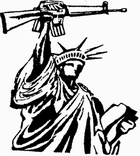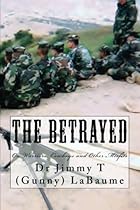But why do you care less about the many more people who were murdered in Chicago last month? Why do you care less about the shocking number of people shot by U.S. cops every year? (Many are unarmed, which doesn’t mean some aren’t dangerous, but state attacks on individuals is still a fearsome trend.) Why aren’t you calling for “we as a society” to do something about the grotesque toll of medical malpractice or the 100,000 or so who die every year from adverse reactions to prescription drugs?
Because “they” don’t care about any of those things. They only care about power and control and harnessing the awesome force of government to do their bidding for them. — jtl, 419
by Claire Wolfe from her Living Freedom Blog
First time commentor Larry L wrote the other day:
I’m not sure what to think about this stuff every time somebody does a multiple murder with a gun.
Everybody trots out their well developed positions with their talking points and talk past each other. The people who are scared of big fierce looking black rifles want all the guns confiscated etc. The people who have their fierce black rifles will only give them up from their cold dead hands etc. Okay, everybody has made their point(s).
There are still x number of people in a theatre/classroom/church/someplace that aren’t coming home today and what are we as a society or civilization going to do about it? I don’t have the answer but shouldn’t we at least ask the question.
Not to single you out, Larry L, but I suspect that a lot of people who don’t believe they have a dog in the gun-rights hunt ask themselves questions like this when these horrible mass shootings hit the news. So I’d like to try to answer your question, which I’ve bolded up there.
First of all, define “we as a society.”
What is “we as a society or civilization”?
Is it government?
Is it non-governmental organizations acting in concert with government?
Is it the media? Schools? Churches? Civic groups? Think tanks? Individuals? All of the above?
Outside of rhetoric, there is no “we as a society” to act in concert on any given issue. On the contrary, there’s all too often some interest group or groups, backed by self-interested movers-and-shakers who think they know what’s best, and nearly always using government as a tool, that pretends to act for “society.” The result is “solutions” that are imposed by force, or by pressure from above, that at best don’t help and more often make matters worse.
Translation of “We as a society”: “there, there, government will take care of it.”
Doesn’t work.
You and me and thee and we as “society”
But what about “society” simply meaning the aggregate of the individuals?
Certainly “we” have amazing influence over events (and each other) even when “we” as individuals have little. From what color car is “in” this year to whether we patronize certain businesses to how we regard gays or blacks or Christians (or gay black Christians!), “we” routinely change the course of society by our individual choices.
Do “we” encourage creepy killers like the ones that struck in Roseburg, Sandy Hook, and Aurora by publicizing their deeds? Well, maybe. But how else would “we” handle this? Lately “we” — meaning bloggers — have joined a trend not to name them. But would you really want the media not to publish their names? First moment the New York Times or USA Today decided not to print the name of some spree killer “we” (bloggers again) would be yelling, “Cover up!”
Could “we” — meaning people who know and associate with the little malcontents who become mass killers — do more to prevent their rampages? That’s complicated, isn’t it? Their own mothers and fathers fail them (usually repeatedly, for years). Other relatives, teachers, social workers, psychiatrists, et al. fail to prevent them from going over the edge (and it appears psychiatrists, with their busy prescription pads for mind-altering meds, help drive them to the brink).
Could “we” — meaning the classmates, fellow church congregants, neighbors, etc. of would-be mass killers — turn them from their course with kindness? Or social pressures? But time and again, the killers turn out to be people who can’t read the social signals that help keep the rest of us within civilized limits. They take offense at everything. They perceive rejection everywhere. They nurse so many resentments that nobody can get close enough to hope to change their minds. Or worse, they are robotically self-programmed — and still beyond reach.
So if there’s a “we” who can be relied on to influence these little creeps away from murder, who is it? And how should they act?
The other “we”
Of course, there’s another “we” that makes up society. It’s just us, going about our ordinary lives, making choices we perceive to be beneficial.
That “we” does a lot of things to prevent crime. First, we don’t commit crime (at least not real crimes, though we certainly routinely break laws, intentionally or otherwise). Second, we guard against harm. We put locks on our doors. If we perceive a need, we install alarm systems and surveillance cams. We avoid situations and people known to be dangerous, and if we must go into bad situations, we’re watchful and behave in ways to minimize the danger.
Increasingly, millions of us know how to handle firearms and carry them routinely (thanks in great part to activists who worked to remove artificial, governmental restrictions on that freedom). And — lo and behold! — despite public perception that crime is rampant, crime has actually been decreasing since the 1970s. Is it decreasing because we’re so much ready to protect against it, these days? You could argue that all day. But it’s a fact that people are taking responsibility to be guardians.
Intractable problems and the media
On those “x number of people in a theatre/classroom/church/someplace that aren’t coming home today” … have some perspective.
Every one of their deaths is a tragedy for them and those who care about them. It’s a tragedy for those who have to witness the horror and those who have to live with the aftermath. But why do you care less about the many more people who were murdered in Chicago last month? Why do you care less about the shocking number of people shot by U.S. cops every year? (Many are unarmed, which doesn’t mean some aren’t dangerous, but state attacks on individuals is still a fearsome trend.) Why aren’t you calling for “we as a society” to do something about the grotesque toll of medical malpractice or the 100,000 or so who die every year from adverse reactions to prescription drugs?
Why are you not inflamed with rage that governments in California are only now — after 1,500 deaths! — trying to prevent suicides on the Golden Gate Bridge?
In short, it’s because you’re being manipulated by the media. Nine dying by gunfire trumps hundreds, or hundreds of thousands, dying by less visible means. Or dying at the hands of government.
This idea that everything can somehow be made perfect is a political one and a religious one. In the real world, things can be made better or worse, but never perfect.
Perfect security and safety are the chimera of our age and a great excuse for tyranny.
You hear repeatedly that the U.S. has one of the highest rates of “gun violence” in the world. But the truth is, the U.S. has the very undramatic rank of 91st in the world’s toll of annual murders.
Oh yeah, it ain’t about black rifles.
It’s funny that Larry L would write, “The people who are scared of big fierce looking black rifles want all the guns confiscated etc. The people who have their fierce black rifles will only give them up from their cold dead hands etc.” Because other than a few hold-out antis who never got the memo that their 10-year ugly-gun ban had zero effect on crime, even our worst opponents aren’t going on about EBRs any more.
But again, this isn’t to signal out Larry L in particular. It’s just another way that people on the outside misperceive what goes on in a power struggle they’re not part of.
And power is what it’s about. It wasn’t about Evil Black Rifles even when it was about Evil Black Rifles. It was never about, and will never be about “handgun control” or “universal background checks” or “closing the gun-show loophole” or “high-capacity magazines” or “keeping the mentally ill from getting guns.”
It’s about control. And for the “we as a society” that craves to manage the rest of us, power actually feeds on horrors like mass killings.
For the “we as a society” who just want to live our lives it’s a different story. That’s why so many are re-assuming the duty of self-defense.
Yes, freedom activists and control-bent elitists talk past each other. So what? We’re not talking to each other. Michael Bloomberg isn’t trying to persuade Wayne LaPierre and Larry Pratt isn’t trying to persuade Josh Sugarman. Mike Vanderboegh and David Codrea aren’t trying to persuade Shannon Watts. That’s not the point.
The only point is: Which course is most likely to produce the freedom that enables us to create both happy individual lives and a civilization to sustain them?
Fact: Government could lock us all in cages and some people would still find ways of hurting others. Don’t be fooled by media reports and the temptation to think that “we as a society” — meaning “they, the government” can compel perfection. Be free and do your own bit to improve lives.
FOLLOW FLYOVER PRESS ON FACEBOOK
 The Betrayed: On Warriors, Cowboys and Other Misfits. Although woven around the experiences and adventures of one man, this is also the story of the people who lived during the period of time in American history that an entire generation was betrayed It is the story of the dramatically changing times in which this personal odyssey took place. It is the story of the betrayal of an entire generation of Americans and particularly the 40% (of the military aged males) of that generation that fought the Vietnam war.
The Betrayed: On Warriors, Cowboys and Other Misfits. Although woven around the experiences and adventures of one man, this is also the story of the people who lived during the period of time in American history that an entire generation was betrayed It is the story of the dramatically changing times in which this personal odyssey took place. It is the story of the betrayal of an entire generation of Americans and particularly the 40% (of the military aged males) of that generation that fought the Vietnam war.










 24 Hour Spot Gold Prices
24 Hour Spot Gold Prices 24 Hour Spot Silver Prices
24 Hour Spot Silver Prices A Handbook for Ranch Managers
A Handbook for Ranch Managers Combat Shooter's Handbook
Combat Shooter's Handbook Flyover Store
Flyover Store FlyoverPress on the Web
FlyoverPress on the Web Planned Grazing: A Study Guide and Reference Manual
Planned Grazing: A Study Guide and Reference Manual The Betrayed: On Warriors, Cowboys and Other Misfits
The Betrayed: On Warriors, Cowboys and Other Misfits